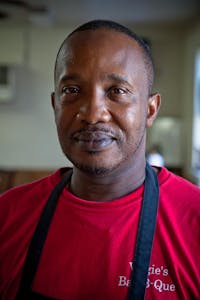
Owner/Pitmaster: Virgie’s Bar-B-Que; Opened 2005
Age: 49
Smoker: Wood-Fired Offset Smoker
Wood: Post Oak
On Virgie’s website they have a brief description of their restaurant, but what has stuck with me was their promise of a “barbecure.” It’s a pun so obvious I’m curious why it isn’t used more often. Their ribs are sure to be the cure for plenty of ailments, and the brisket’s not bad either. I love that sausage too, but Handsborough wasn’t about to tell me where it came from when I first visited. He said “that’s my secret.” I got him to open up a little more over the years, and he even supplied a once closely guarded rib recipe for my book, but he never did tell me the sausage supplier. A few months ago I was shopping in Houston for a little sausage of my own, when a cart load of links pulled right in behind me while I stood at the register. Adrian Handsborough was standing behind it with a grin on his face. I laughed, and told him I could now tell the world where that Virgie’s sausage comes from. Or, I could just let a man keep his secret.
If you want to do some investigating of your own, you can come along on the TMBBQ bus tour coming through Houston in a couple weeks. We’ll make a stop at Virgie’s and you can ask Adrian yourself.
Daniel Vaughn: Are you having a good day today?
Adrian Handsborough: We’ll see at the end of the day. I got a lot going on. We got guys working to put a deck out front, and we’ve got a welder coming out to do some bump posts in front of the deck. I still need to run to Home Depot. It’s been one of those days.
DV: So, you’re making some renovations?
AH: We need a deck to have some outside seating. We’re getting a base down today and hopefully get the awning up next week.
DV: Business must be going well then.
AH: It’s been good. A couple weeks ago was the busiest week we’ve ever had at Virgie’s.
DV: How much did you have to cook for your best week ever?
AH: It means it doesn’t stop. You gotta keep the pit hot. It’s a week of non-stop.
DV: How many pits are you running?
AH: Just two now, but I’m seeing if I can get another one back here.
DV: Creating more work for yourself?
AH: I don’t know. I’ll be up here from 5:00 or 6:00, and I get home at 11:00 or midnight. I’m kinda in a hole, but we’re doing it.
DV: Do you have any help working the pits?
AH: I have a young man who is a good help. He’s had two sick days in a year and a half. He takes a lot off me. I have another girl who’s been here for five years. I can leave the place and she can handle it. I hope she’s here to stay. Really, I just have a great crew, and they all deserve credit.
DV: That’s a good thing to have in the restaurant business.
AH: It is. In the last five years I’ve only had one let down.
DV: The building that you’re in has been in your family for a while. Can you share how you came to have a barbecue joint there?
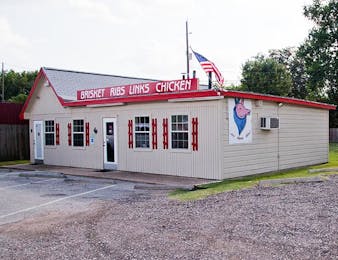
AH: My dad built it with his hands with handsaws. There weren’t any electric saws. It was built the year I was born in 1965. Isn’t that a blessing? He built it for my mom to open a hamburger place called Virgie’s Place. It switched from being Virgie’s Place to Handsborough’s Grocery. She ran it for thirty-three years. In 1998 dad passed away and she got out of it. I struggled trying to keep the store open. It wasn’t making anything, so I went back to driving truck. I drove truck while I was remodeling this building into the barbecue joint. What happened was my wife and I came in and looked at old records. We found a tax stamp all the way back to 1965 with the name “Virgie’s Place.” My wife said “that would be a good name for a barbecue place.” It went from there. It’s not like I’ve made it yet, but we’re trying.
DV: Back when Virgie was running it, did they serve any barbecue?
AH: No barbecue. After the burgers phased out it was a full time convenience store.
DV: Did you grow up in the neighborhood near the store?
AH: Born and raised right here in Carverdale.
DV: What did the neighborhood look like back in 1965?
AH: Totally rural. The guy next door to the barbecue place had hogs and chickens running around. Gessner [the four-lane boulevard that Virgie’s is located along] was two lanes. The adjacent roads were shale. They weren’t even paved. They call it semi-rural now, but back then it was country. Just to give you an idea, there were ten houses out here when my parents came here in fifties.
DV: You’re right there in Houston, but did you consider yourself a country boy growing up?
AH: I still do. I’m a country boy. I relate more to the country than the city. This weekend I had an inkling to get up to the piney woods with the family. We rode up to Montgomery County just to get out of the city. We were with the kids and thinking about maybe going out there when they get out of school, but not yet.
DV: Are you training that next generation in the ways of barbecue?
AH: No way. It’s an honest living, but I’m going to direct mine toward an education. If Virgie’s swells up and I got a big one on 290 and another out in Conroe or something, I might let them run it, but as far as being a pitmaster and breathing the smoke, no. With the smoke, it’s a health issue. I told my wife that we need to get them educated for the global economy. Get them to Japan or China where they can learn the language.
DV: That’s a long way from the country.
AH: I’m country, but that’s an insult when people call you country. You know that, right?
DV: It’s only an insult from city folk.
AH: Yep. My mom and dad are from Centerville about and hour and a half north. As a child we’d go up there twice a year. I still feel like that’s my home.
DV: At some point you decided to see the rest of the country and became a truck driver. How did that happen?
AH: In my younger years – how do you say it – I came up slow. I worked at the store with my mom and dad until I was twenty-eight. I decided I wanted a career. The store was my dad’s. I thought I’d like to drive a truck, so I did it for ten years. My dad had two or three rent houses. The house that I lived in when I was a child, he owned that so I rented it for twenty years or more.
DV: Your folks were quite the entrepreneurs then. They had rent houses, a restaurant and later a store…
AH: Right. My dad was an industrious man. I was just thinking about that this morning. As I try to make this place keep going I remember what my dad taught me about working hard. From working by him for twenty some years I learned a lot. To remodel this place, I couldn’t afford to have it done, so I did it myself. He put that into me. It wasn’t easy working with him, but there have been times when I sit here in this barbecue place crying and thanking God for what my dad taught me.
DV: There’s a lot of pressure there to run a barbecue joint out of the building your dad built and have it named after your mom. It better be good.
AH: That’s right. I do my best.
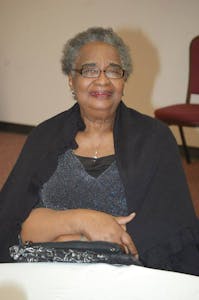
DV: What did you know about barbecue when you opened nine years ago?
AH: I knew from my mom who barbecued, but I didn’t know anything about cooking commercially.
DV: How many briskets had you cooked before you opened?
AH: I cooked two or three before I opened Virgie’s. I had never cooked brisket. Me and my mom would cook ribs, chicken, and sausage. You know, lightweight meat. Before I opened I got my pit put in and my rub mixed up. I invited some friends over. I wanted to fire up my pit and have them check it out for me. One guy told me “it’s real good, but it’s tougher than a West Texas leather boot.” It was tough. This was a preacher and he tells me “this is tough as hell, Handsborough.” But he gave me some advice. He told to let it cook longer to let it tenderize. I didn’t know nothing about brisket when I got in here. I’m not gonna lie.
DV: How long did it take you to get handle on cooking briskets?
AH: It took the first six months. It’s been nine years. Back then I put two briskets, six ribs, two chickens and some sausage on the pit. I haven’t changed the recipe since. I don’t do temperature checks. I just feel it and look at it to see if it’s done.
DV: How does the amount you cook these days compare to back then?
AH: It can’t even compare, guy. It’s like a lemon versus a watermelon. But the price of beef is crazy. I went to Sysco and picked up some brisket. It was $3.30 per pound. When I opened I went to a grocery store that would do me good, and I’d get it at $0.70 per pound. Ain’t that something?
DV: Do you look back at the small amount of food you were selling when you open and wonder how you kept it going?
AH: I often do. The building is paid for, and I thank God for my wife. She let me roll the dice and use our savings for remodeling. If it wasn’t for that I couldn’t have even started. I think my principles that are biblically based are what made it successful – doing what’s right. My wife works and there were times when she would come here on her hour lunch break and work, then she’d have to get out and go back to work.
DV: Did she smell like barbecue back at work?
AH: No. Not really. That’s one thing I can’t stand is for the restaurant to smell like smoke. The smoke stays back in the smoke room. A lot of people don’t like smoke on them.
DV: The smoke gets thick back there. So thick that you wear a gas mask or something, right?
AH: I wear a respirator, or I try to. This thing can get going so fast you just hold your breath, flip your meat, then run and get a breath of air. I know I should wear it every time.
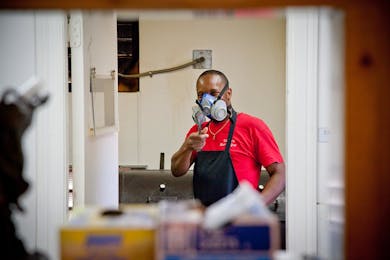
DV: What kind of wood are you smoking with?
AH: I use post oak.
DV: Don’t most of the places in Houston use hickory? What made you choose oak?
AH: When I first opened I didn’t know the difference in what it looked like. I could tell them to bring me oak and they could bring me pecan and I wouldn’t say nothing. Green as grass, that’s what I was.
DV: Has your seasoning changed since you’ve gone along?
AH: Nope. I keep that all the same.
DV: Are those seasonings something you learned from your mom?
AH: Yeah, but a lot of it was just trial and error. Once I got it together I haven’t changed even a tablespoon of what I use.
DV: Where do you get that sausage?
AH: I’d rather not. They’re all beef. When you’re in business, you share some, but you can’t share it all or someone else will do what you do. I’ve seen it done.
DV: It seems like you get the most comments on those giant pork spare ribs that you serve?
AH: That’s right. That’s the biggest seller, and that’s been since we started. “Try these ribs” is the pig’s quote [meaning the pig on their logo].
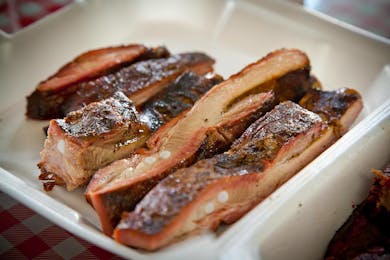
DV: How many racks do you sell these days?
AH: These days? A lot…
DV: You’re full of secrets.
AH: I’m real careful about what I share and who I share it with. I get it from my dad. My dad would say “this is my house, and what goes on in my house stays in my house.” The sauce and the rub, that’s mine. I’m just like that.
DV: There’s nothing wrong with that. You’ve got to stay ahead of the competition.
AH: You know what, I don’t even think about it being a competition. I steer clear of that. I’m just here doing my thing. I don’t need to say I’m the best this or that. It’s not a false modesty. It’s real. There’s always someone better. Also, everybody’s got their own flavor that they like, so to pit one against the next…I steer clear of it.
DV: Did it make you feel uncomfortable to be listed as one of the best in Texas in Texas Monthly?
AH: It made me extremely proud, but that isn’t a competition. It’s a blessing. I thank God for his grace on this business and on my life. For other people to think enough to even come this way, let alone put us in the magazine – I don’t take it lightly.
DV: You’ve certainly gained a new level of notoriety these last few years, but in our past conversations you’ve talked about the importance of staying tied to your community and giving back. Can you talk about your connection to this place?
AH: This community is like a small country town. The demographics were once about 95% African American. How it’s about 50% Hispanic and 50% African American. I was born and raised here, so I have to give back. Two weeks ago my first customer ever passed away. He was in the car with his wife when he first came, and I went out to take a picture of them. He passed away and I brought some food by the house and to the funeral. I have a few elderly folks in the neighborhood that their caregivers come by to pick up food that I give them. Man, here you got me tooting my own horn. Listen, I’m a born again believer and I believe in God, but you’re talking to guy who was out. I was gone for the count. From high school until I was twenty-eight, I was out of it. Everything from that point on has been due to God’s grace.
DV: You also seem to get a lot back from the community. It’s not many businesses that would still have a relationship with their first customer.
AH: I can nearly throw a rock from here and hit my house. I lived in my dad’s old house before we built one across the street. I love my community. I love the church that I grew up in. I basically grew up in this building here. I like to stay close. I moved out of this community when I was thirty, and I moved back a year later.
DV: Country boy for life, huh?
AH: For life.
- More About:
- Black BBQ







